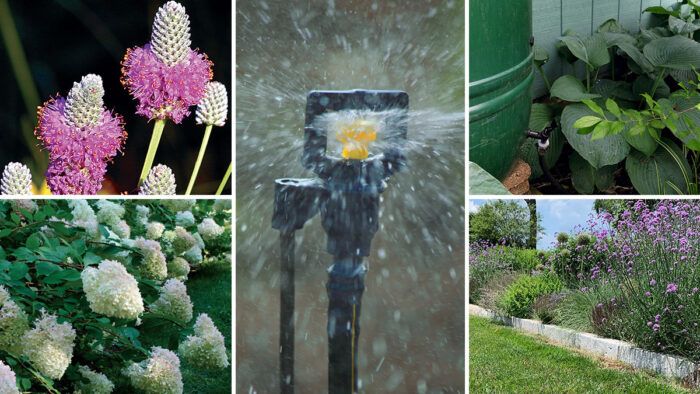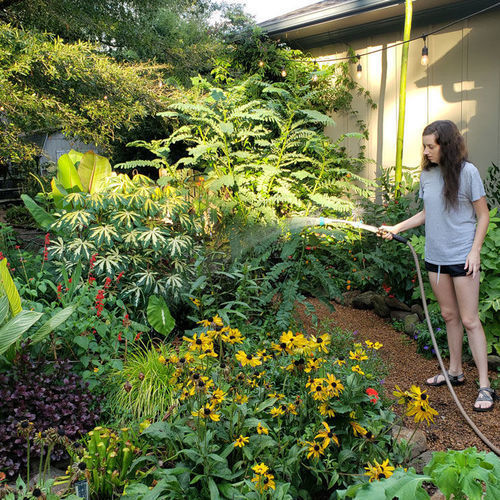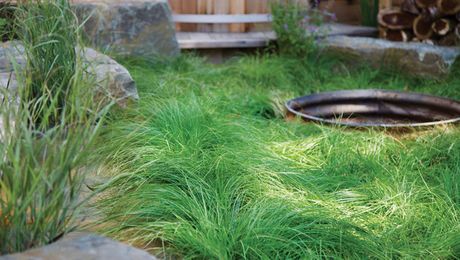
Being more conscious of the water used in gardens is not a responsibility left only to those who experience extreme droughts. If you live in an area that gets regular rain, you might think water is an abundant resource, but this isn’t necessarily the case. Less than 1 percent of the water on Earth is currently available for human use, while our consumption of water continues to increase.
Much of this water usage, and waste, is happening outdoors. According to the EPA, residential outdoor water use accounts for almost 9 billion gallons of water each day in the United States. And as much as 50 percent is lost due to wind, evaporation, and runoff caused by inefficient irrigation methods and systems.
Wasting water isn’t just bad for our environment; it’s also bad for our plants, our wallets, and our backs. Overwatering can be just as detrimental as underwatering, both of which cause plants to miss out on key nutrients. Additionally, excess water running off your property can carry nutrients and soil away from the plants that need it and into our waterways. Think of all that precious water (and money!) literally going down our drains.
On top of all of this, choosing more water-wise plants and tweaking your watering techniques can drastically cut down your time with the hose. After all, whoever enjoyed dragging that thing around their yard anyway?
If you’re ready to start being a more water-wise gardener, check out the articles below. You’ll learn more about the science of watering, find stunning drought-tolerant plant options, and discover design tips and techniques that will help you water more efficiently while keeping your garden eye-catching.
Sources
- EPA: Statistics and facts on water usage
- USGS: Where is Earth’s water?
- Cornell University Cooperative Extension: Water Wise Gardening
-
 Design
DesignThe Art of Watering the Garden
Quench your plants’ thirst with less waste -
 Kitchen Gardening
Kitchen Gardening10 Ways to Conserve Water in the Garden
Save water and time with these garden tips -
 How-To
How-ToHow to Water Your Garden Sustainably
These tools help you put water only where you and your plants want it -
 Design
Design10 Water-Wise Plants
Choose these resilient workhorses for the driest spots in your garden -
 Podcast: Let's Argue About Plants
Podcast: Let's Argue About PlantsEpisode 11: Great Water-Wise Plants
These selections will thrive—instead of die—when things get dry -
 Design
Design10 Drought-Tolerant Shrubs
If these thrived in the driest Alabama summer in a hundred years, think how well they’ll do for you -
 Design
DesignA Water-Wise Garden That Wows
Ditch the lawn for a landscape that looks like it's watered every day -
 Southwest Regional Reports
Southwest Regional ReportsDrought-Tolerant Plants and Design Strategies for the Southern Plains
Prepare for dry conditions with these water-wise techniques and native plants -
 Southwest Regional Reports
Southwest Regional ReportsWater-Wise Rose Care
Here are some tips and tricks for growing roses with less water -
 Southeast Regional Reports
Southeast Regional ReportsWater-Wise Tips for the Southeast
Follow these guidelines to maintain a healthy garden during the drought season -
 Mid-Atlantic Regional Reports
Mid-Atlantic Regional ReportsWater-Wise Tips for the Heat of Summer
Using plant choice, design, technique, and hardscaping, you can save time, water, and money -
 Mountain West Regional Reports
Mountain West Regional ReportsXeriscape Gardening
Plant choices and design principles can create gardens that don’t need any supplemental water -
 Northeast Regional Reports
Northeast Regional ReportsWater-Wise Tips for Northeastern Gardeners
Use these simple strategies to help your plants survive dry weather













